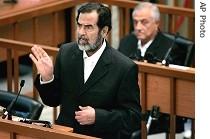2006年VOA标准英语-Kurds Push to Make Strong Legal Case of Genocid(在线收听)
By Brian Padden
Irbil, Iraq
28 August 2006
Kurdish leaders in Iraq say they want to be sure prosecutors build the strongest case possible against Saddam Hussein and six of his military commanders charged with genocide in the Anfal military operation against Iraqi Kurds that prosecutors say killed 180,000 people. VOA's Brian Padden reports from Irbil, in the heart of the Kurdish region of Iraq.
-----
 Saddam Hussein at his trial in Baghdad |
||
"I am one of the witnesses of this place," said Yusif Aziz. "I have personally smelled the mustard gas. I have treated many people, hundred, thousands of people I have treated them."
Dr. Aziz is the minister of human rights for the Kurdistan regional government in northern Iraq. He has been working on the government's case against Saddam Hussein and six of his military commanders charged with genocide against the Kurds. Prosecutors say 180,000 people died in the military campaign.
Dr. Aziz says the Kurds do not want revenge. They want justice under the law.
"We will use the law against him," he said. "Only the law will be the answer of Saddam Hussein."
Dr. Aziz is confident that the overwhelming evidence, the mass graves, the testimony from survivors and official Iraqi government documents ordering mass killings, will be enough to convict the accused in a court of law.
But Civil Rights Association Director in Kurdistan Haval Maaroof is unsure about the government's ability to prosecute this case.
"A case like this, it is a genocide," said Haval Maaroof. "It is like the holocaust. So, I was expecting more from the prosecution."
Maaroof says, within Iraqi law, there is no clear definition of the crime.
"We have created the special criminal court to deal with this case, the case of mass killings, which happened in the Saddam's regime," he said. "But, legally, if we want to define it, we do not have legal articles, or legal text that define it."
Instead, he says, the prosecution will rely on proving that Saddam violated international human-rights accords.
Saddam's lawyers argue that the operation was aimed at wiping out Kurdish separatist guerillas, who sided with Iran in its war with Iraq.
Dr. Aziz says the prosecution's response concedes that Kurds were fighting for independence, but that the response of the Saddam regime far exceeds what is acceptable, even in a time of war.
"Killing innocent people, as a woman and children," said Yusif Aziz. "There is not any law in the world that will give you the right to do this."
Maaroof agrees that the abundance of evidence is indisputable. But he says the prosecution needs to make a strong case in defining the extent of the crime, establishing the intent of the Iraqi leadership to eradicate the Kurds, and linking Saddam to the killings.
"We have to look after the chain of command," he pointed out. "Who gave the orders? We know that, in Iraq, the only person who could give an order was Saddam Hussein."
The trial has been adjourned until September 11.